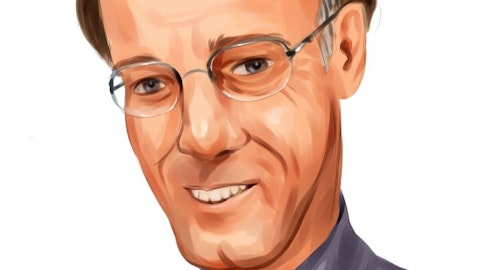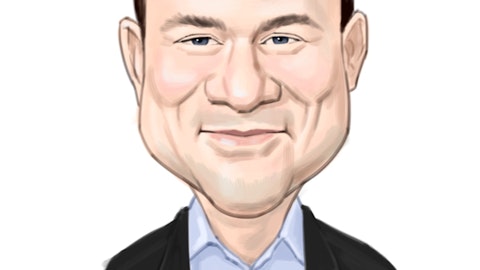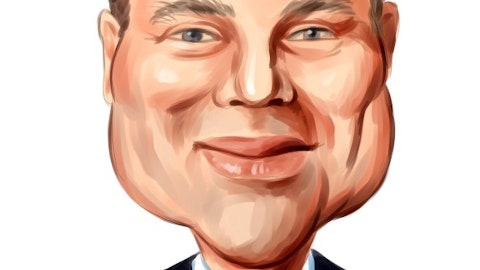In this article we discuss billionaire Ken Griffin’s top 10 stock picks by analyzing his Q4 portfolio. You can skip our discussion about the billionaire’s latest comments on cryptocurrency and his hedge fund’s returns and go directly to Billionaire Ken Griffin’s Top 5 Stock Picks.
Kenneth Cordele “Ken” Griffin is an American billionaire and hedge fund manager who founded investment fund Citadel in 1990. Griffin has been in the news following the reports suggesting his role in funding trading app Robinhood which restricted trading GameStop stock following the “short squeeze” launched by retail and individual investors. The 52-year-old billionaire whose worth stands at $16 billion was asked to testify before the House for his alleged role in Robinhood’s decision to restrict trading of certain securities. In a written testimony, Griffin said :
“I want to be perfectly clear: we had no role in Robinhood’s decision to limit trading in GameStop or any other of the “meme” stocks. I first learned of Robinhood’s trading restrictions only after they were publicly announced.”
Despite the controversies, Griffin remains a stock-picking genius and his portfolio is worth paying attention to. In 2020, the Citadel’s flagship Wellington fund returned 24.4%, its best performance in 8 years, and more than double the S&P 500’s gain. Griffin’s global fixed income fund was up 17.5% in the same period.
Griffin Sees No ‘Economic Underpinning’ of Cryptocurrencies
In a recent interview with CNBC, Citadel’s head said the following about cryptocurrencies.
“I just don’t spend much time thinking about cryptocurrencies. I don’t see the ‘economic underpinning’ of cryptocurrencies. I understand how the value of stock that present the value earnings. I understand how to think about currency exchange rates around the world. I don’t know how to think about what is effectively a digital token.”
Ken Griffin Talks About Melvin’s Gabe Plotkin and GameStop
“I think Gabe Plotkin is one of the finest investors of his generation… If I had to run my business to the possibility of an insane conspiracy theory emerging at any point in time, I would have no business.
In 2017, during Adam Smith Society’s National Meeting, Ken Griffin talked about the investment management landscape and the changing trends in the markets.
“I think there’s 2 shifts taking place that are important to think about. First is the growth rate of hedge funds as an asset class is just stopped. The amount of capital flowing into the hedge funds has you ground to a halt. So there’s no great tailwind making business easier for all. Is it the secular? Is it the cyclical? I don’t know. I think it’s too early to tell. What I do know is that it’s really important that we as a market leader, keep our eyes focused on what we need to do, which is to generate results for our clients, for our stakeholders. So stay close to our core competencies, invest our capital wisely, have a budget that’s going to pay off in the foreseeable future, run our business well. It’s a stressful time, there’s no tailwind at all. We’re going to have to work at it. The second issue is more fundamental to investing as a whole, which is the continued proliferation of information. Today, we have access to an incomprehensible amount of data about how businesses are performing in near real time. The successful firms in money management will learn how to translate that data into information and to act and react with that superior manner over the course of the trading day, weeks, and months. So firms that are less competent and capable at managing information are going to be left by the wayside. Markets will be more efficient, and there will be less alpha for everyone to capture. Fortunately, this is simply the march of progress, and we have 2 choices. We can be in denial about this fact, or we can embrace this reality, and embracing this reality means that we have to be world leading at data management, and processing it, converting the information that portfolio managers use, and then the skills of successful portfolio managers will shift from those who understand the quarter, to those who are able to better understand the future. We are going to see a shift in the core competencies of successful portfolio managers. Again, this is just the march of progress, and financial services is no more or less immune than any other part of our economy. It’s simply up to my team to embrace that reality and to move forward.”

Ken Griffin of Citadel Investment Group
While Griffin is able to sustain strong returns, the same is not true for the broader hedge fund industry, which is losing ground amid severe losses. Its reputation has been tarnished in the last decade, during which its hedged returns couldn’t keep up with the unhedged returns of the market indices. On the other hand, Insider Monkey’s research was able to identify in advance a select group of hedge fund holdings that outperformed the S&P 500 ETFs by more than 124 percentage points since March 2017. Between March 2017 and February 26th 2021 our monthly newsletter’s stock picks returned 197.2%, vs. 72.4% for the SPY. Our stock picks outperformed the market by more than 124 percentage points (see the details here). We were also able to identify in advance a select group of hedge fund holdings that significantly underperformed the market. We have been tracking and sharing the list of these stocks since February 2017 and they lost 13% through November 16th. That’s why we believe hedge fund sentiment is an extremely useful indicator that investors should pay attention to. You can subscribe to our free newsletter on our homepage to receive our stories in your inbox.
10. Apple Inc. (NASDAQ: AAPL)
Value: $483,958,000
Percent of Ken Griffin’s 13F Portfolio: 0.13%
No. of Hedge Fund Holders: 146
Apple ranks 10th on the list of billionaire Ken Griffin’s top 10 stock picks and his Q4 portfolio. Apple is one of the most popular stocks among the 887 hedge funds tracked by Insider Monkey. A total of 146 funds ended the fourth quarter of 2020 with stakes in Apple, compared to 134 funds a quarter earlier. Apple shares have gained about 103% over the last 12 months. Evercore recently maintained its Outperform rating for Apple and upped its price target for the stock to $175 from $163.
Warren Buffett’s Berkshire Hathaway is the biggest stakeholder in the company, with 887.1 million shares, worth $117.7 billion. AAPL ranks 10th in our list of the 30 Most Popular Stocks Among Hedge Funds: 2020 Q4 Rankings.
In their Q3 2020 investor letter, Alger Spectra Fund Fund highlighted a few stocks and Apple Inc. (NASDAQ:AAPL) is one of them.
Here is what Alger Spectra Fund said:
“Apple is a leading technology provider in telecommunications, computing and services. Apple’s iOS operating system is the company’s unique intellectual property and competitive strength. This software drives extremely tight engagement with consumers and enterprises. This tight engagement is facilitating significant growth in high-margin services like streaming music. apps. and Apple Pay. Apple’s continued development of high-margin services and earnings streams for wearable devices as well as the potential contribution of 5G phones to the company’s growth supported the performance of Apple shares.”
9. Analog Devices, Inc. (NASDAQ: ADI)
Value: $494,605,000
Percent of Ken Griffin’s 13F Portfolio: 0.13%
No. of Hedge Fund Holders: 58
Massachusetts-based Analog Devices ranks 9th in Ken Griffin’s portfolio as of the end of the fourth quarter of 2020. The company makes chips and devices for analog, mixed-signal and digital signal processing (DSP) and ICs. The company is listed in Insider Monkey’s top 10 semiconductor stocks to buy now. The stock is up 87% over the last 12 months.
According to our database, the number of ADI’s long hedge funds positions increased at the end of the fourth quarter of 2020. There were 58 hedge funds that hold a position in Analog Devices Inc. compared to 52 funds in the third quarter. The biggest stakeholder of the company is Generation Investment Management, with 5.9 million shares, worth $865 million.
8. Uber Technologies, Inc. (NYSE: UBER)
Value: $518,494,000
Percent of Ken Griffin’s 13F Portfolio: 0.14%
No. of Hedge Fund Holders: 135
Billionaire Ken Griffin’s Citadel increased its hold in Uber by 11257% in the fourth quarter, ending the period with 10.2 million shares of the company, worth $518.5 million. Uber has 93 million monthly active users as of the fourth quarter of 2020. As the global economy slowly comes back to normal, analysts are hopeful that Uber will be able to offset the huge losses incurred during the coronavirus crisis. Uber’s food delivery service Uber Eats is already raking in huge revenues for the company. In the third quarter of 2020, the service’s revenue was $1.45 billion, up 125% on a YoY basis and beating the company’s core ride-sharing revenue of $1.37 billion.
With a $1.4 billion stake in UBER, Altimeter Capital Management owns 28.4 million shares of the company as of the end of the fourth quarter of 2020. Our database shows that 135 hedge funds held stakes in Uber Technologies as of the end of the fourth quarter, versus 100 funds in the third quarter. UBER ranks 12th in our list of the 30 Most Popular Stocks Among Hedge Funds: 2020 Q4 Rankings.
Miller Value Partners, in their Q4 2020 investor letter, said that Uber Technologies, Inc. (NYSE: UBER) was a top contributor for their portfolio in the fourth quarter of 2020.
Here is what Miller Value Partners has to say about Uber Technologies, Inc. in their Q4 2020 investor letter:
“It was a busy quarter for Uber Technologies (UBER) who took off in the quarter following the passing of Proposition 22, their ballot initiative that allows them to classify their drivers as independent contractors and not employees. The company also reported 3Q results that was largely in-line with expectations. Adjusted net revenues of $2.81B was slightly below expectations of $2.82B with EBITDA of -$625M coming in slightly worse than expectations for -$623M. The company reiterated their expectation that they will reach EBITDA profitability at some point in 2021, as their Eats business continues to see strong growth as the pandemic continues. The company announced the sale of ATG, their self-driving car unit, to Aurora for $4B, while investing $400M in the business and holding a 26% share of the combined entity. This was followed by the announcement of the company selling Uber Elevate, their air taxi business, to Joby Aviation with Uber investing an additional $75M in Joby. The company’s acquisition of Postmates closed in the quarter and Mexico’s antitrust regulators approved Uber’s acquisition of Cornershop, the Latin American grocery delivery company. The company also announced a joint-venture with SK Telecom, to create a South Korean taxi-share company investing $150M in the start-up.”
7. Alphabet Inc. (NASDAQ: GOOG)
Value: $534,112,000
Percent of Ken Griffin’s 13F Portfolio: 0.14%
No. of Hedge Fund Holders: 157
Alphabet ranks 7th on the list of Ken Griffin’s top 10 stock picks. Citadel increased its hold in the company by 273% in the fourth quarter, ending the period with a $534.11 million stake. As of the end of the fourth quarter, there were 157 hedge funds in Insider Monkey’s database that held stakes in Alphabet Inc., compared to 150 funds in the third quarter. Chris Hohn’s TCI Fund Management, with 2.95 million shares of GOOG, is the biggest stakeholder in the company. GOOG ranks 6th in our list of the 30 Most Popular Stocks Among Hedge Funds: 2020 Q4 Rankings.
In the Q4 2020 investor letter, Bretton Fund highlighted a few stocks and Alphabet Inc. (NASDAQ:GOOG) is one of them. Here is what the fund stated:
“Google (aka Alphabet) was one of our best performing stocks last year, returning 30.9%, while its earnings per share increased 19%. As lockdowns first went into place in the spring, many advertisers hit pause on their campaigns, waiting—like a lot of us—to see what the world would look like. And then—like a lot of us—advertisers adjusted. Travel companies cut back their campaigns, while ads for other goods, like athleisure wear and video games, picked up the slack. Google had a rough second quarter, but was back in the swing of things by the next quarter.”
6. T-Mobile US, Inc. (NASDAQ: TMUS)
Value: $553,320,000
Percent of Ken Griffin’s 13F Portfolio: 0.15%
No. of Hedge Fund Holders: 103
TMUS ranks 6th on the list of billionaire Ken Griffin’s top 10 stock picks. The telecom company on March 17 priced $1.2 billion of 2.625% senior notes due 2026, $1.25B of 3.375% senior notes due 2029 and $1.35B of 3.500% senior notes due 2031, with an expiry date of March 23. The company recently launched its “un-carrier” feature to focus on bringing the 5G benefits to businesses.
A total of 103 hedge funds tracked by Insider Monkey were bullish TMUS at the end of the fourth quarter, up from 94 funds a quarter earlier. TMUS ranks 20th in our list of the 30 Most Popular Stocks Among Hedge Funds: 2020 Q4 Rankings.
Schroder Investment Management said in their letter that they are hopeful for T-Mobile US, Inc. (NASDAQ: TMUS)’s growth. Here is what Schroder Investment Management has to say about T-Mobile US, Inc. in their investor letter:
“T-Mobile US, Inc.’s (“TMUS”) 2020 merger with Sprint Corporation (“Sprint”) was transformational. The company now controls c.45% of low/mid-band spectrum (which is crucial for 5G) but has only 29% of industry subscribers. We expect this gap to narrow over time, via market share gains, while the deal will also generate significant merger synergies; TMUS should, consequently, achieve substantial profits and free cash flow growth over the next 3-4 years.
TMUS has, hitherto, had an inferior network to its peers, and achieved its subscriber growth via very effective marketing and lower prices, encapsulated in its ‘un-carrier’ approach.
In the 5G era, however, it will have a much better network than its peers – as well as lower prices – because it has more of the critical mid-band (2.5GHz) spectrum than AT&T Inc. (“T”) and Verizon Communications Inc. (“VZ”) combined.
The value of this advantage is reflected in the very aggressive C-Band auction currently underway, in which all three companies have likely spent heavily; T and VZ to supplement their holdings of the key enabling asset for the new 5G era, and TMUS to reinforce its advantage and force its peers to leverage up, so they will be less likely to compete on price. The proceeds from this auction have already reached $81bn (and will entail further substantial spending to ready it for use).
Thus, TMUS is targeting the rollout of its 2.5GHz spectrum across 100mn and 200mn POPs by the end of 2020 and 2021 respectively; this will allow it to offer average speeds of 300Mbps (peak speeds >1Gbps) to subscribers (using only 60MHz of the total 160MHz it owns). Its coverage/offer will be far superior to the competition: T’s standard 5G speeds are 40-60Mbps (i.e. barely faster than 4G LTE); VZ’s 5G ultra-wideband network will offer faster speeds (in theory up to multi-Gbps) but currently covers only 2mn POPs, and is difficult to scale because the mmWave spectrum, on which it relies, propagates only over very short distances and is subject to interference (e.g. by foliage).
It is unlikely that the C-band auction will allow T/VZ to rectify their considerable spectrum lag relative to TMUS: 280MHz is being sold, and VZ requires c.190MHz and T c.150MHz to match TMUS. And the spectrum will take considerable time to clear and be deployed (120MHz clears in December 2021 and 160MHz in December 2023). It is also worth noting C-Band is not nearly as good as TMUS’ 2.5GHz – it has weaker propagation characteristics, thus requiring a much denser network grid which is more costly.
We forecast TMUS to grow its market share of subs by only 100bps per annum 2021-2024, i.e. in line with its prior rates, despite having a better network and cheaper pricing than T/VZ. The key risk to this is stronger competition from Dish Network Corp (“Dish”), who must build out a 5G network as part of the TMUS/Sprint merger conditions. However, it will take time for it to truly be a viable competitor (it targets 50% US POP coverage by 2023), and T/VZ likely have more to lose from a new competitor given their higher prices.
The company has guided to $6.7bn of cost synergies over the next 3-4 years. These have so far come in faster than expected, and we feel that TMUS may exceed its guidance (it beat its targets for the MetroPCS acquisition by 40% and achieved them 1 year early). Network costs represent 63% of expected synergies, and these are cost savings from the decommissioning of cell sites, as the company moves from 110K today to 85K over the next few years. Back office and sales and marketing cost saves will yield the rest.
We estimate that costs/sub will drop from their current c.$26 to c.$19 by 2024 (broadly in-line with VZ) helping drive service margins from 40% to 56%, in-line with T but still well below VZ’s 66% (reflecting TMUS’ lower prices). The combination of modest 3-4% per annum revenue growth, high cost take-out, and declining capital intensity should drive normalised FCF/share to c.$16 in 2024 implying a multiple of c.9x. We feel this is attractive given TMUS’s spectrum advantages and its position as the lowest price, i.e. most competitive, service provider.”
Click to continue reading and see Billionaire Ken Griffin’s Top 5 Stock Picks.
Suggested articles:
Disclosure: None. Billionaire Ken Griffin’s Top 10 Stock Picks is originally published on Insider Monkey.




